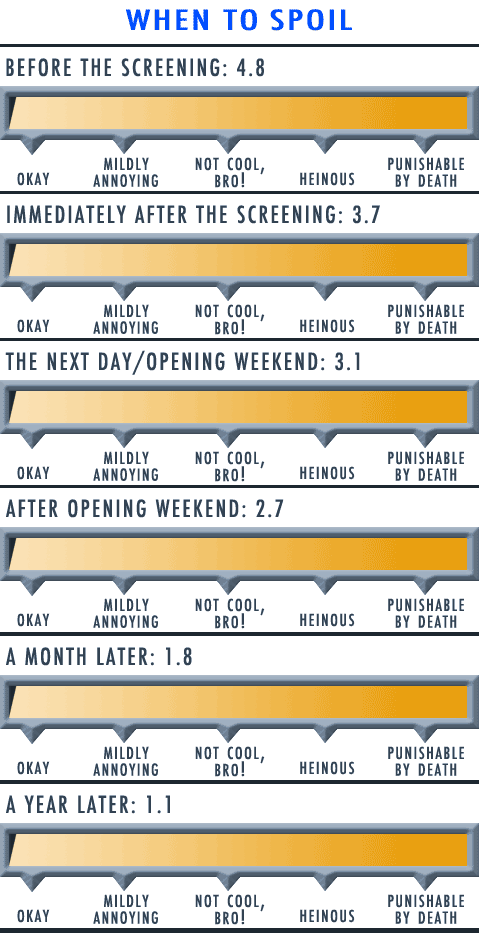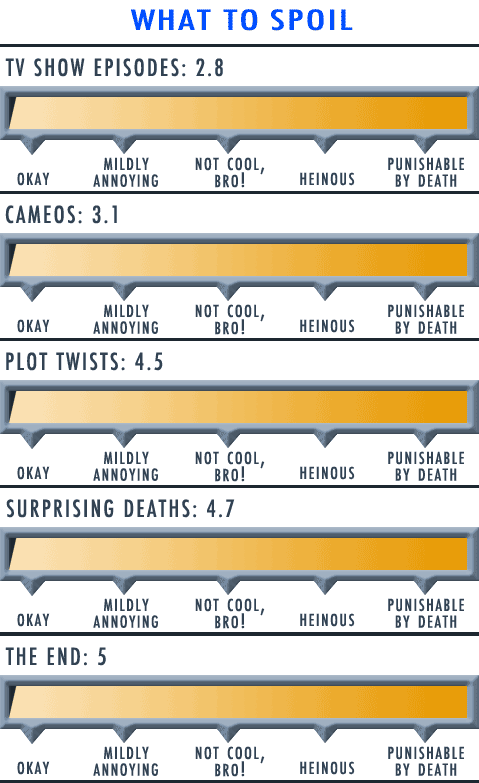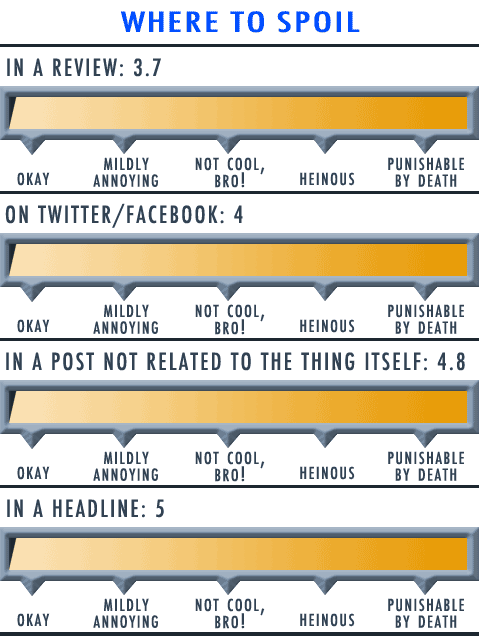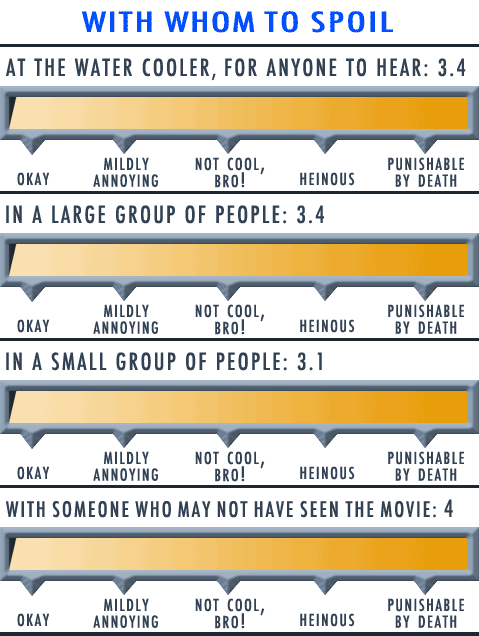
What counts as a spoiler these days? There's as many answers to that question as there are angry commenters who will jump on us every time we mention what seemed like a minor plot point from last night's TV episode, or reveal the ending of The Sixth Sense when we thought that was very much common knowledge. With everyone talking to each other online all the time, every day, it's hard to hide from information you don't want to hear-- and screaming "Hey, spoiler alert!" will get attention, but it won't really fix the problem.
And all this is magnified when you get a movie like this weekend's Cabin in the Woods, which is a twist on the horror genre that contains a lot of surprises, and is really best seen knowing absolutely nothing about it. Those of us who have seen it already have been walking on eggshells to avoid spoiling it for everybody else, but while we waited for Cabin we got to thinking, who really judges what makes a spoiler and what's OK? Why hasn't anyone decided this?
So, of course, we decided it. Welcome to the Spoiler Supreme Court, in which our team of spoiler experts tackles four different types of spoilers, gauges their various degrees of awfulness, and comes up with a majority opinion that settles the matter once and for good. Read our decisions and our majority opinions, then go forth into the world to make these decisions law. The Court has spoken.

THE VERDICT
Is it ever OK to drop a spoiler on someone? And if yes, then when? It’s a question we ask often in this industry, where we are tasked with reporting on tiny details pertaining to upcoming movies and television shows, yet challenged with figuring out how to do it without revealing too much. Drew Goddard’s The Cabin in the Woods presented a unique spin. Because we love it so, we want to preserve the experience for newcomers, knowing that to enter the movie fresh means you’ll likely enjoy the ride that much more. But how do you talk about a movie (or show) without explaining, in detail, how or why you like it?
The Cinema Blend Spoiler Supreme Court weighed in on when we’re allowed, as an entertainment-loving community, to spoil a juicy plot point, cameo or twist. And not surprisingly, it’s proportionately calculated to the amount of time that has passed. If you wait too long to watch The Sixth Sense, it’s not our fault if someone at a party tells you that Bruce Willis was dead the whole time. The movie’s been out forever. Get with the program. However, the closer you are to a release date, the more heinous it is to blurt about crucial details, like that thing about Cabin I so desperately want to talk with you about but can’t. Not yet. That would be punishable by death. Do you agree? Is it OK to spoil after enough time has passed, like a month or – even better – a year? Or are they forbidden forever, meaning pop-culture conversation is protected by “law” around these parts?

THE VERDICT
Your Daily Blend of Entertainment News
We, the Cinema Blend court on spoilers, deem that revealing surprising ends, be it an unexpected death or the film's finale, are the most egregious of spoiler offenses. Both received a unanimous decision of being "punishable by death" from our panel.
Sure, it's frustrating when someone divulges spoilers for a TV episode you haven't yet seen. Agreed, it's vexing when surprise cameos are leaked, as it detracts from the thrilling moment of discovery in theaters. But few things rile us as much as giving away those carefully guarded plot points that could pull us to the edge of our seats in alarm or wonder.
Revealing plot twists is a willful and mean-spirited spoiler that could deaden the impact of a movie before its even begun, especially when it's that final twist that forces you to reconsider all that's come before. Whether it is a death you never saw coming or a revelation that shakes the world of the protagonist and by extension your viewing experience, these elements of films should be held sacred and kept secret as dictated above.
So, we entreat you: be respectful of your fellow movie lovers; don't be a spoiler.

THE VERDICT
With great power comes great responsibility, and when you're writing about movies and TV online-- whether on your own twitter feed or on an esteemed movie site like this one-- you've got to be careful before revealing too much. When you put up a spoiler warning, of course, anything is fair game, but if you want to bring up the ending of The Sixth Sense or what happened on last night's Game of Thrones in detail on the Internet, for anybody who follows you or reads you to see, you might be better off keeping your mouth shut.
The Cinema Blend Spoiler Supreme Court decrees that, when you're spoiling something online, consider the context. If it's in the midst of a review-- say, Rex Reed's already infamous review of Cabin in the Woods-- it's not cool, bro, to spoil a movie, but it's also your perogative. But when you start dropping in spoilers out of context, say on somebody's twitter or Facebook feed? That's downright heinous. And if you bring up a spoiler in a post about something else entirely-- say, get into detail about Sun and Jin's fate on Lost in the middle of a post about Mad Men- or drop that detail right in a headline, your crime deserves to be punished by death. So sayeth the Supreme Court, so say we all.

THE VERDICT
We’ve all been there. You’re hanging out with a group of friends when all of a sudden one of them starts talking about a movie they saw and immediately assumes that everyone in the world has the exactly same social schedule. They start shooting off at the mouth about the end of a film that you haven’t seen yet, and all of a sudden you find that the entire experience is ruined and those two tickets in your pocket are now completely useless. But how wrong was your callous friend?
The Cinema Blend Spoiler Supreme Court has ruled that the degree of the crime runs in correlation with the amount of people that can hear the spoiler speak. Though definitely not cool, bro, the larger the group the less harsh the crime as there is a better percentage chance that people have actually seen the movie or television show that is being ruined. Though it’s not a steep drop, the harshness of the crime decreases as the group gets smaller, but don’t you dare spoil a film in a one-on-one conversation – it’s not that hard to ask one person if they’ve already seen the thing you’re talking about.
